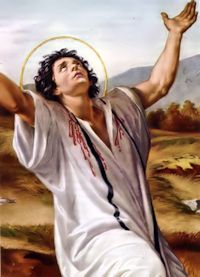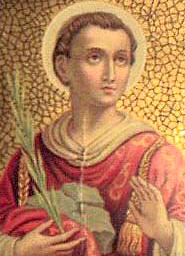Christmas: December 26th
Feast of St. Stephen, first martyr
Old Calendar: St. Stephen ; Other Titles: Boxing Day
Today is the second day in the octave of Christmas. The Church celebrates the Feast of St. Stephen, the first Christian martyr. Stoned outside Jerusalem, he died praying for his executioners. He was one of the seven deacons who helped the apostles; he was "filled with faith and with the Holy Spirit," and was "full of fortitude." The Church draws a comparison between the disciple and his Master, emphasizing the imitation of Christ even unto the complete gift of self. His name is included in the Roman Canon.
St. Stephen
The deacon Stephen, stoned in Jerusalem two years after the death of Christ, has always been the object of very special veneration by the faithful. He is the first martyr. The account in the Acts of the Apostles relating his arrest and the accusations brought against him emphasize the parallel with our Saviour's trial; he was stoned outside the city wall and died, like his Master, praying for his executioners.
Stephen belongs to the group of seven deacons whom the Apostles associated with their work in order to lighten their load. He was "filled with faith and with the Holy Spirit," "full of grace and strength" he showed himself as a man of God, radiating divine grace and apostolic zeal. As the first witness to Christ he confronted his opponents with quiet courage and the promise made by Jesus (Mark 13.11) was fulfilled: ". . .Disputing with Stephen they were not able to resist the wisdom and the spirit that spoke."
In St. Stephen, the first martyr, the liturgy emphasizes the imitator of Christ even to the extent of the complete gift of self, to the extent of that great charity which made him pray in his suffering for his executioners. By establishing the feast on the day after Christmas the Church draws an even closer comparison between the disciple and the Master and thus extends his witness to the whole mission of the redeeming Messiah.
Professing the Christian Faith Demands the Heroism of the Martyrs On the day after the solemnity of Christmas, we celebrate today the feast of St. Stephen, deacon and first martyr. At first glance, to join the memory of the "protomartyr" and the birth of the Redeemer might seem surprising because of the contrast between the peace and joy of Bethlehem and the tragedy of St. Stephen, stoned in Jerusalem during the first persecution against the nascent Church.
On the day after the solemnity of Christmas, we celebrate today the feast of St. Stephen, deacon and first martyr. At first glance, to join the memory of the "protomartyr" and the birth of the Redeemer might seem surprising because of the contrast between the peace and joy of Bethlehem and the tragedy of St. Stephen, stoned in Jerusalem during the first persecution against the nascent Church.
In reality, this apparent opposition is surmounted if we analyze in greater depth the mystery of Christmas. The Child Jesus, lying in the cave, is the only-begotten Son of God who became man. He will save humanity by dying on the cross.
Now we see Him in swaddling clothes in the manger; after His crucifixion, He will again be wrapped in bandages and placed in the sepulcher. It is no accident that the Christmas iconography sometimes represents the divine newborn Child lying in a small sarcophagus, to indicate that the Redeemer was born to die, He was born to give His life in ransom for all.
St. Stephen was the first to follow in the steps of Christ with martyrdom: like the divine Master, he died forgiving and praying for his executioners (cf. Acts 7:60). During the first four centuries of Christianity all the saints venerated by the Church were martyrs.
They are a countless multitude, which the liturgy calls "the white army of martyrs," (martyrum candidatus exercitus). Their death was not a reason for fear and sadness, but of spiritual enthusiasm, which always gave rise to new Christians. For believers, the day of death, and even more so, the day of martyrdom, is not the end of everything, but rather the "passage" to immortal life, it is the day of the final birth, the "dies natalis." Thus is understood the link that exists between the "dies natalis" of Christ and the "dies natalis" of St. Stephen. If Jesus had not been born on earth, men would not have been able to be born for heaven. Precisely because Christ was born, we are able to be "reborn."
Also Mary, who took the Redeemer in her arms in Bethlehem, suffered an interior martyrdom. She shared His Passion and had to take Him, once again, in her arms when they took Him down from the cross. To this Mother, who felt the joy of the birth and the anguish of the death of her divine Son, we entrust those who are persecuted and those who are suffering, in different ways, for witnessing and serving the Gospel.
With special spiritual closeness, I am also thinking of the Catholics who maintain their fidelity to the See of Peter without giving in to compromises, at times even at the cost of grave sufferings. The whole Church admires their example and prays that they will have the strength to persevere, knowing that their tribulations are a source of victory, though for the moment they might seem to be a failure.
Angelus Message, Pope Benedict XVI, December 26, 2006
Patron: Casket makers; coffin makers; deacons; headaches; horses; masons; diocese of Owensboro, Kentucky; stone masons.
Symbols: Deacon carrying a pile of rocks; deacon with rocks gathered in his vestments; deacon with rocks on his head; deacon with rocks or a book at hand; stones; palm of martyrdom.
Things to Do:
- Read Pope John Paul II's 2003 Angelus Message for the Feast of St. Stephen.
